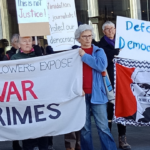Australia’s Denial of Indigenous Rights: An Interview with Koorie Institute’s Terry Mason

The United Nations Declaration on the Rights of Indigenous Peoples (DRIP) is an international human rights agreement outlining the inalienable rights of the First Peoples of all continents and islands of the globe. Although it’s not legally binding, it sets up guiding principles for governments to abide by.
Enshrined within the 46 articles of the document are Indigenous peoples’ right freedom from discrimination, their right to maintain and strengthen their own distinct political institutions, as well as their right to self-determination and autonomy.
The declaration defines both the individual and collective rights of Indigenous peoples. It covers the right to cultural identity, along with the rights to education, health, employment, language, and religious traditions and customs.
Disregarding Indigenous rights
The DRIP was adopted by the UN General Assembly on September 13 2007. An overwhelming majority of 144 nations voted in favour of adopting the declaration. There were only 11 nations that abstained. And there were four that voted against it: the United States, Canada, New Zealand and Australia.
The Australian government’s refusal to ratify the declaration protecting the rights of First Peoples was despite the fact that the nation had already been signatory to seven other major international human rights treaties over the three decades prior.
Then prime minister John Howard argued that it wasn’t difficult to come to the decision to reject the declaration of Indigenous rights, as the document proposed to legitimise customary law, and it was wrong to set up separate development within the one country.
However, today, under Australian Law, Aboriginal and Torres Strait Islander people are the most incarcerated people on earth. And by most accounts the Indigenous and non-Indigenous communities of this continent are at vastly different levels of economic development.
Under the Rudd government, Australia eventually endorsed the DRIP on April 3 2009, but due to the earlier vote against the agreement, it didn’t become a signatory.
On the domestic front
A line in the preamble to the DRIP states that there’s an “urgent need to respect and promote the rights of Indigenous peoples affirmed in treaties.” However, treaty is a concept that successive Australian governments have refused to consider.
A treaty is a formal settlement or agreement made between two independent states. Treaties establish binding obligations between parties, dealing with matters such as self-determination, land rights and custodianship.
Many Indigenous people want to see the establishment a series of treaties between the Australian government and the continent’s First Nations.
However, over the past seven years, the federal government has been pushing for constitutional recognition – a statement of recognition of Indigenous people in the preamble or body of the constitution.
Never ceded
Awabakal man Terry Mason has been active in the Aboriginal rights movement all his life. He can recall marching down the street back in 1988, calling out for land rights – long before the chant was replaced by native title rights.
Sydney Criminal Lawyers® spoke with Terry Mason, curriculum developer and lecturer at the Institute of Koorie Education at Deakin University, about the significance of the DRIP, regressive Australian government policies, and the need to establish treaties now.
In your opinion, what is the significance of the UN Declaration on the Rights of Indigenous Peoples?
I think there is a great importance in such a document, because it assists in the definition of matters.
There’s a debate at the moment around the separation of powers, between statements made by some government ministers and the courts. And the importance in that issue is that governments legislate law, but courts interpret how that law works and the intricacies of that law.
In my mind, the UN Declaration on the Rights of Indigenous Peoples has a similar role to the court. Because it’s interpreted the definition of the matters and the rights of Aboriginal peoples around the world.
It’s an interpretation by an international body that gives a moral force, providing minimum standards that Australia and other countries could be guided by in dealing with Aboriginal peoples.
In saying that, a lot of the conversations over the years, have more or less said that these types of declarations are not only universal – and belong to all – but that they use the term “inalienable” quite often, and that’s an important term, as it means that these rights can’t be taken away.
That means they’re indivisible and independent, and governments shouldn’t be able to pick and choose what they want. These are the rights of Indigenous peoples around the world and it’s something to be recognised by governments when they form policy, not to choose which bits they wish to interpret for their own ends.
The UN Generally Assembly adopted the DRIP by an overwhelming majority. However, the Howard government voted against it.
Why do you think Australia voted against this agreement, after having ratified seven other international human rights treaties that came before it?
We could do a very long history lesson there on Australia and its involvement with the United Nations. How proactive Australia had been prior to this decision. The change of leadership under the Howard government and the attitudes that went with that leadership.
Australia had been at the forefront of many issues concerning Aboriginal peoples. But once John Howard came into the debate, there was a different emphasis given. A lot of it was around opposition to the Native Title Act.
Up until then, Aboriginal peoples had been advocating for land rights. Eddie Mabo certainly wasn’t looking for native title. He was wanting recognition of land rights.
Article 3 of the UN declaration talks of Indigenous people having the right to self-determination, the determination of their political status and being able to freely pursue their economic, social and cultural development.
Article 4 expands on that having the right of autonomy or self-government around matters relating to internal and local affairs, as well as ways and means of financing their autonomous functions.
Now this goes right to the nub of the debate that had been going on around native title, with Aboriginal rights under native title being the subservient one – having the weakest right, and certainly, they don’t go to the nature of articles 3 and 4.
So if one looked at those and the type of statements that John Howard was making around the time on native title – I’m paraphrasing here, but “We’re one country, with one history and we’re one people. We’re not going to have divisiveness.”
Ratifying this declaration goes against everything that was in their best interest at the time, as opposed to Aboriginal interests.
The Rudd government endorsed the declaration in 2009. What do you think the significance was of the Australian government endorsing the declaration at a later date, even though, they could never officially ratify it?
It’s an interesting one. Jenny Macklin, in talking about the adoption of the UN Indigenous declaration, said, “Relationships will be tested and they will evolve but the declaration gives us new impetus to work together in trust and good faith.”
That statement comes to the nub of why they may have wanted to adopt it at that stage. Because the relationship had soured so badly between Aboriginal peoples and Australian governments, over issues of true self-determination, rights, land rights and rights to advocacy.
If one looks at a statement like that, adoption is giving the government an appearance of legitimacy, while still upholding the Intervention and Stronger Futures.
What they were doing – with withdrawing the Racial Discrimination Act – was not looking good in front of the Commonwealth peers and members of the United Nations. So, adoption was more a lip service to give legitimacy to what was going on, and a recognition of the poor relationship.
Do you think we can see a link between the Commonwealth’s reluctance to endorse this declaration and its reluctance to enter into treaty negotiations with the Indigenous peoples of this continent?
Certainly, there has been an incredible resistance to recognise any form of true treaty, whether in older forms, or more modern robust forms that we’ve seen in other Commonwealth peer countries.
There’s quite strong evidence that there’s a link between the reluctance to endorse such declarations and it’s not just around treaties. It’s about the issues that treaties would bring up. That’s around self-determination and autonomy.
You can’t endorse one strongly without engaging in negotiations of the other.
Can we draw any links to other policies the federal governments of this country have implemented and their initial rejection of the DRIP, as well as their reluctance to negotiate treaties?
There has been concerted and constant criticisms of the governments – and I say governments – because Liberal and Labor governments have endorsed policies around the Intervention, forced closures, the community development programs, which are bringing back virtual slave labour again, and policies of child removal.
There’s a lack of movement in closing the gap in anyway at all. And in most instances the gap is widening. It’s an indictment on Australian governments over quite an extended period of time now.
Since 2010, the federal government has been pushing for constitutional recognition. Why do you think this government – that has been so reluctant to enter into other processes – are keen to see this one come about?
Constitutional recognition, in the opinion of many Aboriginal peoples, is something that would bring Aboriginal peoples out of their sovereignty and out of their ability to claim that they have sovereign rights, and that they have the rights to determine their own future, as per the UN declaration.
It would be assimilationist in nature.
People are conflating the terms constitutional reform and constitutional recognition. One can reform a constitution – particularly around issues of race – without recognising Aboriginal people in there if there is uncertainty about the legal status of Aboriginal people under recognition.
If there’s a need to recognise Aboriginal peoples in the constitution, without recognising their rights under the UN – which Australia hasn’t done, by not signing these documents – or entering into treaties, then one would have to be suspicious that their motive is to weaken the case for Aboriginal autonomy by making us just part of the general Australian population, and dealt with in the same way as everyone else.
So you’re saying that recognition wouldn’t be a token gesture, it would actually impact on First Peoples sovereignty.
That’s the belief of people in the community consultations around the country. It is their fear. And no one has assuaged that fear. It’s still there and there has been no evidence to the contrary at the moment.
On May 26, the Uluru Statement from the Heart was read out at the final Dialogue meeting run by the Referendum Council.
What did you think about the outcome of the Uluru summit and the ideas expressed in the statement?
It’s an interesting one. The one page statement that most people have seen is a feel good document. I’ve also seen the 23 pages that came behind that, and that concerns me far more.
It’s because of the 23 pages that came behind it and the process involved in those that is the concern around the Uluru Statement. It is not an Aboriginal way of doing business that is proceeding post the Uluru Statement.
It had 13 consultations across the country. That isn’t widespread consultation. It wasn’t about informed consent. It wasn’t about two way dialogue. Most of the consultations were by invitation only. So there certainly wasn’t consultation about it at all.
There was a pressure to come to an agreement on the final day at Uluru. This is not an Aboriginal way of doing business.
Then to have the Referendum Council go away and by the end of the month put a report to the government, without taking that report back to Aboriginal communities for their discussion and informed consent is certainly not an Aboriginal way.
And it flies in the face of the UN document on the rights of Indigenous peoples.
They have the right to self-determination and to pursue their own ways of autonomy. It’s a fraught manner of process and it is certainly not reflective of an Aboriginal way of doing business, nor the diversity of Aboriginal issues across the country.
On Wednesday, a bill was passed through federal parliament that amended the Native Title Act, so as to reverse the effect of the McGlade decision of the High Court in February this year in regards to the Noongar native title agreement.
These changes to the Act were seemingly made to appease Adani and ensure that their Carmichael coalmine can go ahead in Queensland.
What do you think about the federal government going to the lengths of amending the Native Title Act to suit the interests of international corporations?
It’s an absolutely disgusting move, and it’s far wider than Adani.
The Native Title Act was always a flawed act in the opinion of Aboriginal people. If there was to be any contesting amongst stakeholders over native title claims, then the Aboriginal claim was subservient and lost.
It only gave the right to consultation with Aboriginal people. It certainly wasn’t a robust title. It’s not land rights.
It’s a much, much wider issue than just the Adani issue. It hearkens back to the earlier questions you asked on why the Australian government did not endorse the UN rights of Indigenous peoples back in the Howard era, and it’s the same issue then.
It’s about control of land and resources and the denial of Aboriginal peoples of any of their sovereign ability to be autonomous around their own affairs, and their own development.
You’re a long-time Indigenous rights activist, and have seen many changes come about.
In your opinion, at present, have things improved for Aboriginal and Torres Strait Islander people living in Australia over recent decades?
No. To be quite blunt, no. One might see the appearance of improvement, in there being a lot of dialogue and a lot of conversation.
But the whole process involved in the Recognise campaign around constitutional recognition is proof that there isn’t widespread and true consultation with Aboriginal people.
There isn’t a process that takes their concerns on board, considers those and then takes those back to those peoples, until a consensus is agreed to, and it’s an informed consent that’s given to any change. This is not anything that’s been happening.
So no. If things had improved in any way at all, you would see an improvement in the indicators on closing the gap. The only one that has shown any minor improvement is the infant mortality rate. Most of the others have gone backwards.
There is no way anyone could claim that things have improved for Aboriginal and Torres Strait Islander people, when the removal of Aboriginal children at the moment is at a higher number than at any other time in Australian history.
And when suicides and incarceration rates have just increased phenomenally, one cannot say that things have improved for Aboriginal and Torres Strait Islander people.
And lastly, Terry, what do you think needs to happen in this country in order to see meaningful change come about for the land’s sovereign peoples?
We need to engage in true treaty negotiations. If you look at Article 3 of the DRIP it says that Indigenous peoples have the right to self-determination. By virtue of that right, they freely determine their political status, and freely pursue their economic, social and cultural development.
Article 4 goes onto say they have the right to autonomy or self-government in matters relating to their internal and local affairs, as well as ways and means of financing their autonomous functions.
That has to be negotiated in recognition of a sovereignty that hasn’t been ceded. These are robust modern treaties that have to be negotiated.
There is going to be no improvement until Australia comes to terms with this.
Now that doesn’t have artificial deadlines tied to it. And I think that’s one of the real problems. There seems to be a push to have all of those issues settled quickly. And that could be tied up with control of land and resources because treaties would change that game quickly.
But in not determining treaties, we’re actually harming Aboriginal people in other ways.
In the preamble to the DRIP they talk about Indigenous people having control over developments affecting their land, territories and resources that will enable them to maintain and strengthen their institutions, cultures and traditions. And to promote their development in accordance with their aspirations and needs.
It goes onto talk about the well-being of their children, consistent with the rights of the child. And talks about treaties being a basis for a strengthened partnership between Indigenous peoples and states.
That lays it out pretty clearly that what we need are robust treaties and there’s the rationale for them.
Now that’s not just about land and resources that’s about children, but it’s also about strength and partnerships. And that hearkens back to that idea that Jenny Macklin was edging around in 2009. That we need to be able to work together in trust and in good faith.
Now how do you work in trust and good faith in the environment at the moment, where we have a process that hasn’t done well and is actually causing division, both within non-Aboriginal Australia, within Aboriginal Australia, and between both parties.
Australia needs to actually take a deep breath, step back, and look at its Commonwealth peers. Look at some of these document such as the DRIP and start bargaining in good faith.
Terry, thanks very much for taking the time out to have this chat with us today.
Thank you.







